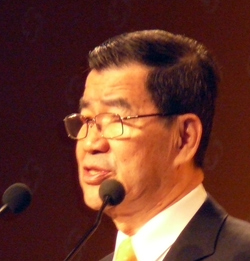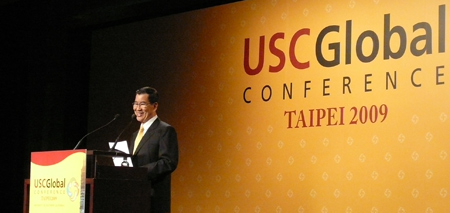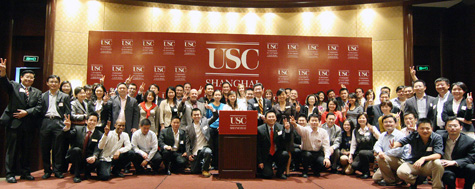
Talking Points
November 4 - November 11, 2009
Dear Zhenying,
Opening the 2009 USC Global Conference on Thursday USC Provost and Executive Vice President Max Nikias announced the largest gift to the USC US-China Institute to date. Two alumni from Taiwan have given US$2 million to endow the institute director’s chair. As Provost Nikias said, “While we respect the wish of the donors to remain anonymous, we see this gift as but the latest welcome sign of the firm commitment alumni have to the institute and its mission. Every day headlines pound home the centrality of the multifaceted U.S.-China relationship not just for our two countries but for the world. Our institute is unique in its focus on this relationship. This gift affirms the importance of this work.”
We’re honored by this generous gift. It represents appreciation for all that the institute has accomplished since its establishment in 2006 and an endorsement for our ambitious agenda to inform public discussion and policy development via social science research, innovative training programs, publications and documentaries, and public events. More information about these efforts is available at our website.
We’re in the midst of the Taipei Global Conference and its illuminating presentations and discussions of pressing issues regarding economic and political trends, health, energy, and the digital present and future. This year’s gathering is the largest in the series, involving more than 500 participants from ten countries or regions.

Vincent Siew at the USC Global Conference, Oct. 30, 2009
On Friday, Taiwan’s Vice President Vicent Siew (蕭萬長Siew Wan-chang) expressed his love for the Los Angeles Lakers and then offered a detailed examination of the impact of the global economic downturn on Taiwan, the measures the government had taken in response, and the results thus far. Siew explained that Taiwan had long been dependent on exports, and that the dependency had grown over the last decade. In 1999, exports constituted 41% of Taiwan’s GDP and in 2008 their share of GDP had increased to 65%. This meant that Taiwan was especially vulnerable when the downturn resulted in a dramatic drop-off of imports by the U.S. and other countries. Siew and President Ma Ying-jeou took office in May 2008 just as the brunt of the downturn hit Taiwan. Working with a legislature dominated by their Kuomintang party, the administration worked to
- stabilize the banking system (e.g., by guaranteeing all savers’ deposits),
- ensure that firms could get access to capital (e.g., by cutting interest rates and by increasing the government’s enterprise loan guarantee maximum by 20%)
- stimulate domestic demand through income tax cuts, wage subsidies, job training programs, and coupons issued citizens to boost spending at the lunar new year.
Siew argued that these and other efforts have worked and that the worst is over. Taiwan’s GDP shrank during the first nine months of 2009, but Siew expects fourth quarter growth to be over 5%. At the same time, Siew argued that while the short term situation is now improving, major efforts must be initiated to further boost domestic demand and to accelerate development of key economic sectors such as biotechnologies, green energy, tourism, and high end agriculture.

Vincent Siew at USC's Taipei Conference

Some of those attending the opening of USC's Shanghai Office.
Earlier in the week, USC opened its Shanghai Office. More than twenty news organizations and fostering deeper research and educational exchanges with China-based scholars, students, and professionals.
One such exchange took place on Wednesday, when USC and The Economist sponsored “Life after 60: What’s next for the PRC?” More than 150 members of Economist Intelligence Unit's Corporate Network attended the symposium. Briefing materials offered a sampling of earlier forecasts of China’s future and presentations focused on the challenges journalists face in covering China, the country’s economic and demographic situation, and the need for finance and corporate governance reform, as well as looks at how international China’s current leadership is, the views of Chinese who studied abroad and returned to work in China, and the diverse and sometimes contradictory views held by Chinese youth. The symposium concluded with the screening of a segment from the US-China Institute's new documentary Reporting China.
We’ll have fuller descriptions of the Shanghai symposium and the Taipei conference on our website next week.
******
U.S. President Obama will visit China November 15-18. He’ll have much to discuss with Chinese President Hu Jintao and other officials. Top trade officials from the two countries met this week in Hangzhou. Both sides signaled their eagerness to cooperate. The US announced it would lift restrictions on some Chinese poultry products and China announced it was lifting a ban on pork imports from the US. But trade relations remain tense. For example, this week Chinese trade officials notifed their US counterparts that they’ve received petitions asking them to investigate whether the US is unfairly subsidizing car companies and car exports. The US only exports about 30,000 cars a year to China, but the move reflects current strains in US-China trade relations, especially following Obama’s decision to impose a 35% tariff on Chinese tires imports. Equally high on the Obama visit agenda are discussions on efforts to stem global warming. Todd Stern, the top US negotiator, said this week that the presidents will not sign any agreement, but many hope that the visit will move the two largest greenhouse gas-emitting nations towards some sort of compromise. None of the major polluters have committed to specific reductions or to how those who fail to meet such targets will be sanctioned. The European Union, however, has committed to contributing to a fund to aid developing countries combat climate change.
******
Among the highlights in the calendar below are a New York discussion of the arts and China’s national identity, a Honolulu talk on ecotourism in China, and the 2009 Sammy Yukuan Lee Lecture in Los Angeles. As always, details about these events and many more are available below and in the calendar section of the USC US-China Institute website.
Please note that the deadline to apply to become a student ambassador for the USA Pavilion at next year's Shanghai Expo has been extended to November 15. Also, secondary school teachers are encouraged to register for our new South Bay seminar. Information is available in the K-12 curriculum section of our website.
We love hearing from readers. Please write to us at uschina@usc.edu.
Best wishes,
The USC U.S.-China Institute
http://china.usc.edu
11/04/2009: Chinese Investment and Aid in Cambodia
UC Berkeley
Address: IEAS Conference Room, 2223 Fulton Street, 6th Floor
Cost: Free
Time: 12:30PM - 2:00PM
UC Berkeley presents a talk by Michael Sullivan on Chinese investment in Cambodia in the context of strengthening bilateral relations between the two countries.
11/05/2009: Introduction to the Asian Area and the Chinese Medicinal Herb Garden
UC Botanical Garden
Conference Center, Mirov Rm., Berkeley, CA
Cost: Free, registration required
Time: 2:00PM - 4:00PM
UC Berkeley presents a lecture and tour of the Chinese Medicinal Herb Garden.
11/05/2009: Panel Discussion: Designing China
Orange County Museum of Art
Address: Lyon Auditorium
Cost: Free
Time: 7:00PM
The University of California Humanities Research Institute presents a panel discussion on Designing China, a seminar in experimental critical theory hosted in Shanghai this summer.
11/07/2009: The Buddhist Arts of Tea in Medieval China
Lenart Auditorium, UCLA Fowler Museum, Los Angeles, CA
Cost: Free
Time: 2:00PM - 3:00PM
UCLA Fowler Museum presents a talk by James A. Benn on the role of Buddhism in the creation of Chinese tea culture.
11/10/2009: Healing Without Harm: Traditional Chinese Medicine and Endangered Species in Asia
Fromm Hall, University of San Francisco, Parker St. (between Golden Gate & Fulton) San Francisco
Cost: Free
Phone: 415-422-6828
Time: 4:45PM - 7:30PM
Join Jill Robinson and Lixin Huang for a fascinating look at the use of endangered species products in traditional medicine.
11/12/2009: Red-Headed Mummies and Indo-European Languages: The Archaeology and Linguistics of Migration in 'Chinese' Eurasia
UCLA Faculty Center, Sequoia Room
Cost: Free
Time: 4:00PM - 6:00PM
The Asia Institute presents a panel presentation with Elizabeth Barber and Melanie Malzahn on the discovery of red-haired mummies and an Indo-European language within the territory of modern China.
11/12/2009: The Elvera Kwang Siam Lim Memorial Lecture in Chinese Studies: Chinese Reforms in Historical and Comparative Perspective
UC Berkeley
Address: Heyns Room, Faculty Club, Berkeley, CA
Cost: Free
Time: 4:00PM - 6:00PM
UC Berkeley presents a talk by Prasenjit Duara on the last 30 years of reform in China.
11/12/2009: Taiwan Culture in the New Millennium: A Conversation with Two Cultural Figures
10303 Bunche Hall, UCLA
Cost: Free
Time: 5:00PM - 6:30PM
The UCLA Center for Chinese Studies presents a roundtable with screenwriter and novelist Chu Tien-wen, and novelist, poet, and naturalist Liu Ke-shiang.
11/13/2009: Wartime Culture and Economy
UC Berkeley
IEAS Conference Room, 2223 Fulton Street, 6th Floor, Berkeley, CA
Time: 9:00AM - 5:30PM
UC Berkeley presents a one-day conference on the various aspects of culture and economy that pertain to the daily lives of the Chinese people during times of war.

















